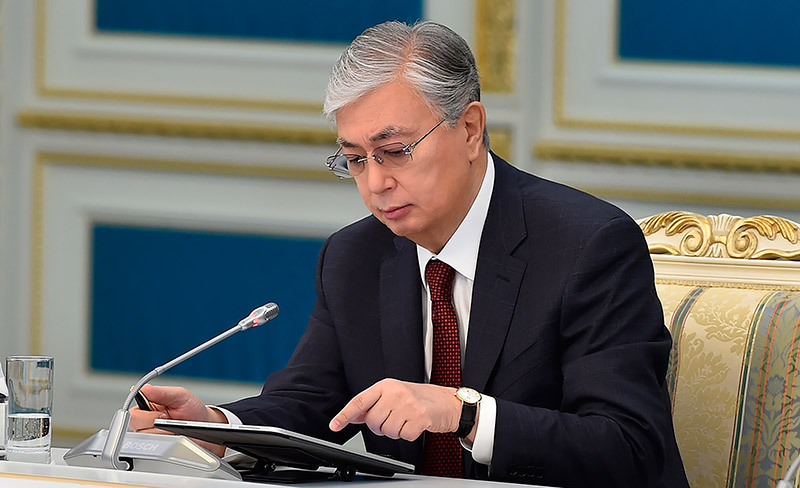 Since he was elected in June 2019, Kazakhstan’s President Kassym-Jomart Tokayev (above) has shown that he will do his best to carry out the citizens’ wishes, concerns and hopes.
Since he was elected in June 2019, Kazakhstan’s President Kassym-Jomart Tokayev (above) has shown that he will do his best to carry out the citizens’ wishes, concerns and hopes.
He has made his main priority the reformation of state and government services so they are more responsive to the needs and ambitions of the people.
This, he has made clear, is the best way to build on the legacy of Kazakhstan’s First President Nursultan Nazarbayev who, until he stepped down in 2019 after 28 years in charge since independence, had led Kazakhstan to be the most economically successful and socially stable country in Central Asia.
On September 1, 2020, Mr Tokayev said, while reading out his official speech titled Kazakhstan in the face of a new reality: Time For Action: “We’re not stopping anywhere. We are gradually adapting our political system to the new situation.
“Our society needs political reforms, so we will definitely continue. The main enemies of democracy are ignorance and populism. This fact must be taken into account. The successful implementation of these reforms and changes depends on the unity, patriotism and civic responsibility of all of us.”
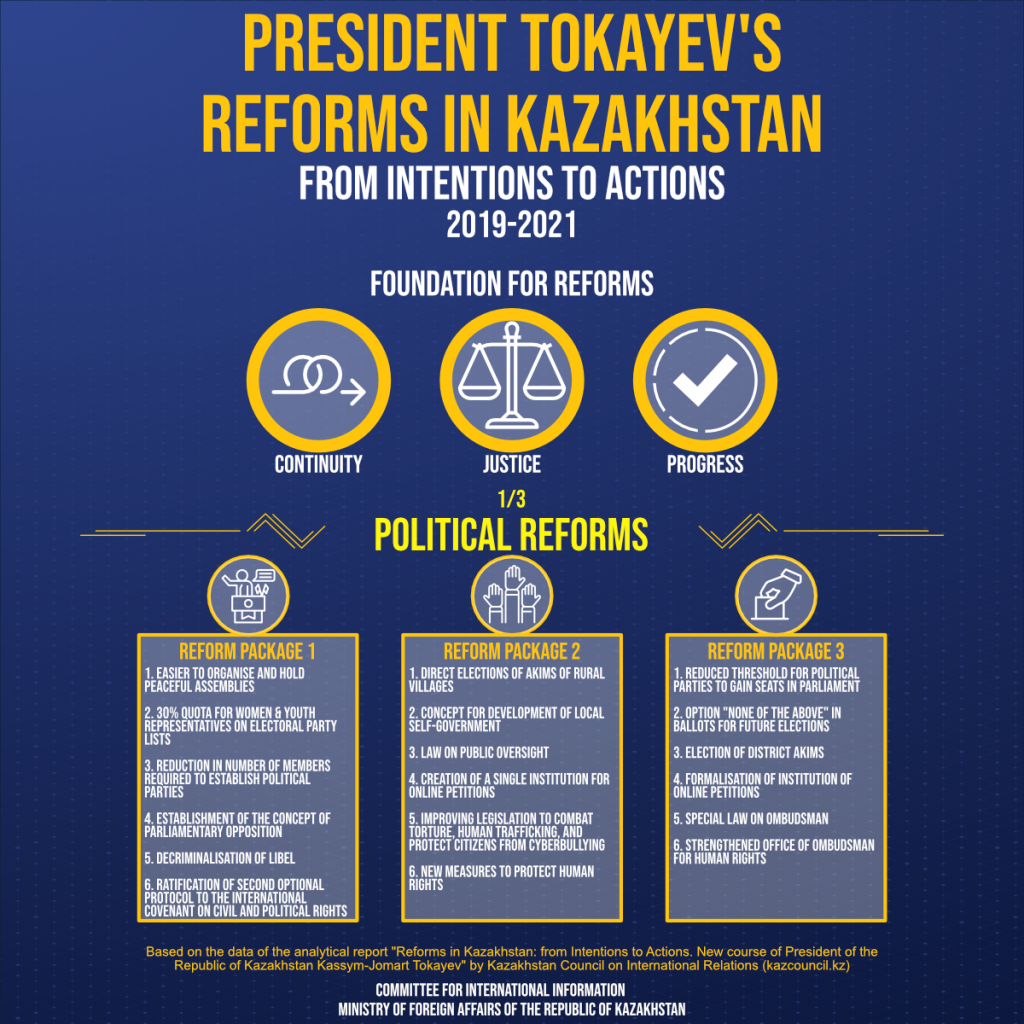 It is clear that the President wants to introduce new reforms along the lines of “different views, one nation, strong president-effective and Parliament-accountable government” and build a “state that hears its people”.
It is clear that the President wants to introduce new reforms along the lines of “different views, one nation, strong president-effective and Parliament-accountable government” and build a “state that hears its people”.
In this context, he was quick to establish a “Social Trust Council” to include representatives of non-governmental organisations, economists and intellectuals.
With the new council, he aims to take decisions on the most urgent and critical issues.
The council has already met more than 20 times. Although it is still new, it has made amendements to seven laws.
The President has also implemented some laws for the formation and diversification of the political opposition, including the electoral law, the law on political parties’ situation and a package of other political reforms.
Amendments to the law on elections and the law on political parties have made it mandatory for the first time to include 30 per cent women and young people on party lists.
This step is also aimed at lowering the average age in parliament and the bureaucracy.
On January 2, 2021, the death penalty was abolished.
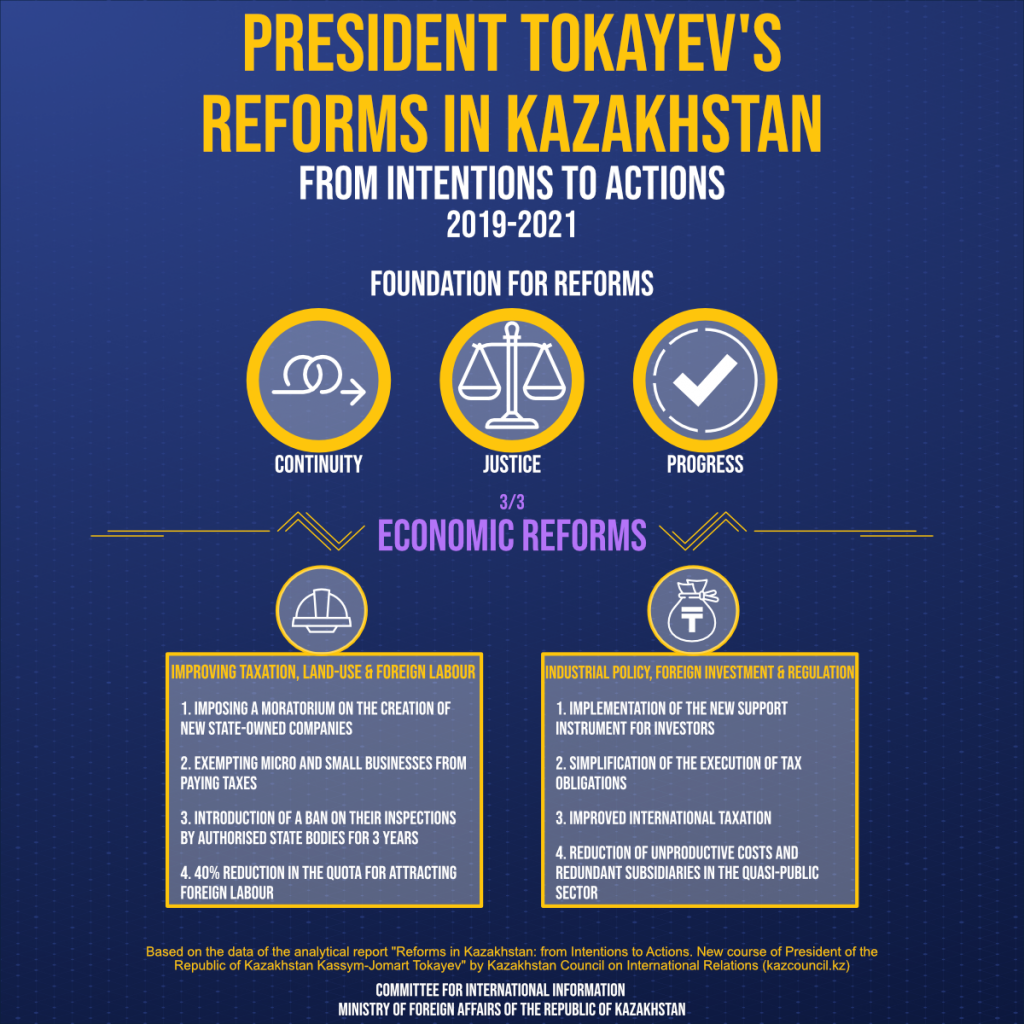 Mr Tokayev, who has held key postions in the government and parliament, has indicated that he does not want an administration that is cumbersome and devoid of coordination.
Mr Tokayev, who has held key postions in the government and parliament, has indicated that he does not want an administration that is cumbersome and devoid of coordination.
In the nearly two years he has been in charge, he has also announced a series of significant reforms to strengthen the criminal justice system and ensure opportunity is extended to all.
To increase protection for women and bring Kazakhstan into line with other developed nations, he, with the agreement of Parliament, has toughened penalties for those found guilty of sexual and domestic violence. Jail sentences for people traffickers have also been increased to underline Kazakhstan’s determination to stamp out this evil trade.
Growing public worries over the accidents and injuries caused by drink driving have led to stronger prison terms. Those convicted of selling drugs to children now know they could face the rest of their life in jail.
He has wasted no time either in extending opportunity to all and increasing support to those who need it most. Along with substantial extra investment to improve health care, there are extra funds for special rehabilitation centres across the country. Companies are now expected to create more opportunities within their workforce for those with disabilities.
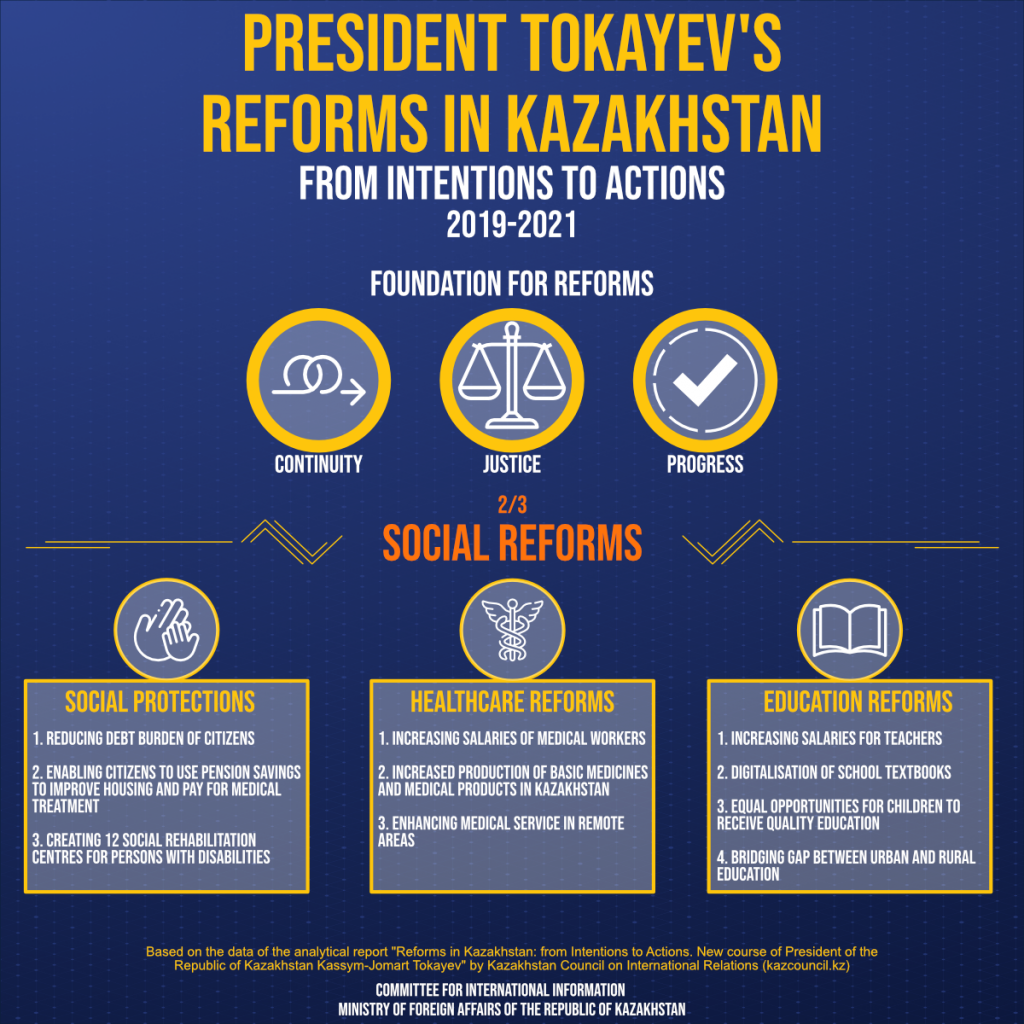 There is extra help, too, for Kazakhstan’s children and young people. Children from low-income families receive a guaranteed social package, including free school meals and transportation to and from school. University scholarships have also been increased by 25 per cent to help develop the rich potential of the country’s younger generation.
There is extra help, too, for Kazakhstan’s children and young people. Children from low-income families receive a guaranteed social package, including free school meals and transportation to and from school. University scholarships have also been increased by 25 per cent to help develop the rich potential of the country’s younger generation.
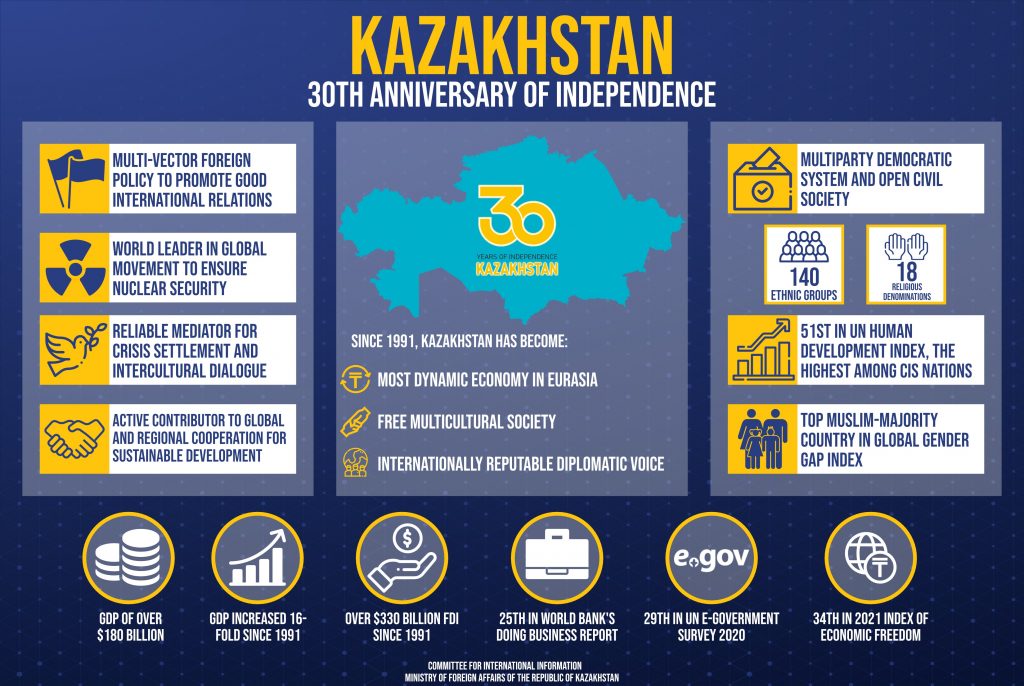 It is a packed agenda and there is lots to do if Kazakhstan, which is celebrating its 30th anniversary of independence in 2021, is to join the ranks of the world’s most developed 30 countries. But Mr Tokayev is promising there will be no slow-up in reforms.
It is a packed agenda and there is lots to do if Kazakhstan, which is celebrating its 30th anniversary of independence in 2021, is to join the ranks of the world’s most developed 30 countries. But Mr Tokayev is promising there will be no slow-up in reforms.
Kazakhstan, from a difficult beginning, is already among the top 50 nations. Building a truly responsive state where the voices of its citizens are heard and understood will help close the gap.
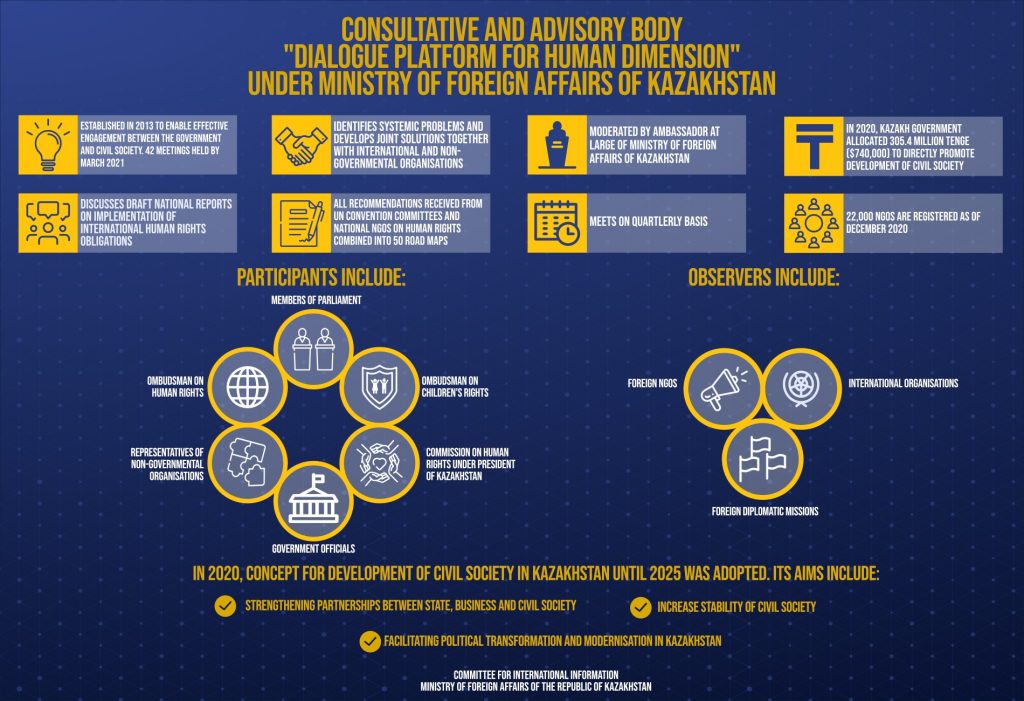
Three packages of political reforms
The first package of political reforms, announced by Mr Tokayev in December 2019, has been fully implemented. It includes:
1. The Law on the Procedure for Organising and Holding Peaceful Assemblies, which replaced the previous principle of granting permission to hold assemblies by notifying authorities
2. The Constitutional Law on Amendments to the Constitutional Law of Kazakhstan on Elections in Kazakhstan, which established a 30% quota for women
and youth representatives on electoral party lists
3. The Law on Amendments to the Law of Kazakhstan on Political Parties, which reduced the number of members required for the establishment of political parties from 40,000 to 20,000 people.
4. The establishment of the concept of the parliamentary opposition, which ensures that opposition parties represented in the Mazhilis are guaranteed the chairmanship of one standing committee and position of Secretary for two standing committees of the Chamber
5. Decriminalisation of Article 130 of the Criminal Code of Kazakhstan on Libel
6. Ratification of the Second Optional Protocol to the International Covenant on Civil and Political Rights aimed at the abolition of the death penalty
The second package of political reforms includes the following measures:
1. Direct elections of akims (mayors) of villages in 2021
2. Development of the Concept for the Development of Local Self-Government
3. Development and adoption of the Law on Public Oversight designed to ensure greater openness and accountability of government agencies and quasi-public sector
4. Creation of a single institution for online petitions
5. Improving legislation to combat torture, human trafficking and protect citizens (especially children) from cyber bullying
6. Adopting new measures to protect human rights and joining the Optional Protocol to the Convention on the Rights of the Child on a Communications Procedure
A third package of political reforms contains the following measures:
1. Reduce the threshold for political parties to gain seats in the Mazhilis from 7% to 5%
2. Introduce the option “none of the above” in the ballots for all future elections
3. After the introduction of elections of rural akims, Kazakhstan will then proceed to the election of district akims
4. Legally formalise the institution of online petitions
5. Adopt an additional law on ombudsman
6. Strengthen the Office of the Commissioner for Human Rights (including the creation of regional offices)
7. Implementation of the Youth Development Index
8. Provide measures to stimulate the activities of charities
9. Further improve the system of public oversight












